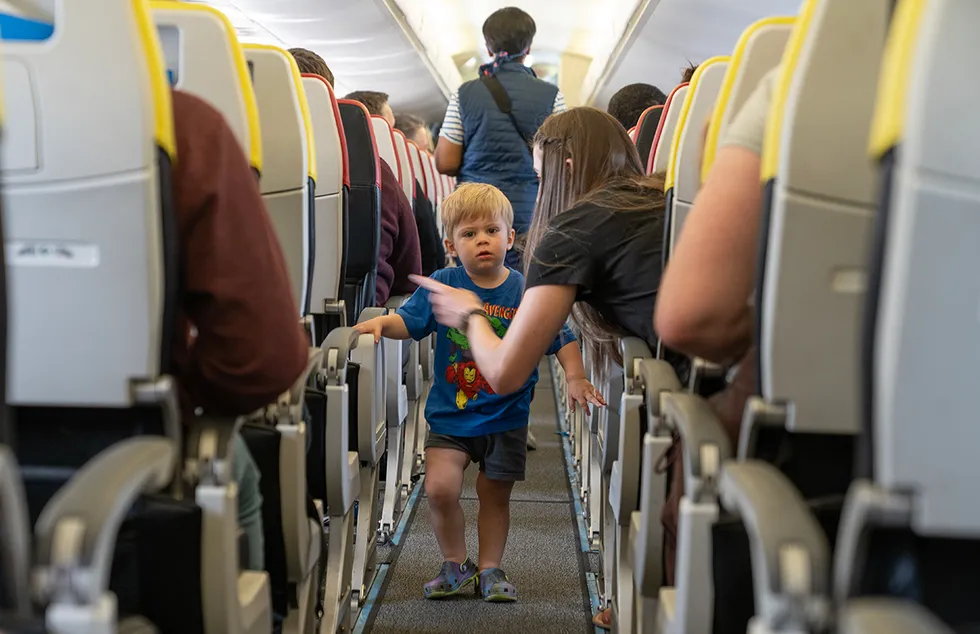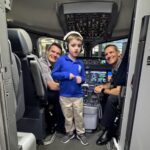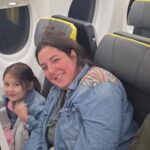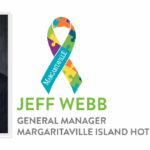
We staged an Autism Flies event in Provo, Utah. That is a much further west than our previous events in Hartford, Connecticut. Where are we headed next? Take a look at our schedule.
In the meantime, here are the reviews from this one.
PROVO, Utah ― Breeze Airways’ flight 9951 to Provo, Utah, on April 30 was a lot like any other flight: all the pre-departure announcements were made in the gate area, passengers boarded by zone, the flight attendants gave their safety demonstration, snacks were served – the whole nine yards. But the plane never left the ground.
That’s because flight 9951 was a different kind of trip for the passengers and staff onboard.
“We don’t fly much in general, and with them, we’ve been intimidated by the process,” passenger Travis Hoki said pointing to his son. “Max is doing well, and we figured this group would be understanding if he’s loud and crazy.”
Max, Hoki’s 3-year-old son, has autism, and flight 9951 was designed for travelers like him to get familiarized with air travel.
“It’s an opportunity to do something that’s just so meaningful for a group of travelers that, in many cases, wouldn’t be travelers if it weren’t for this type of event,” said Breeze Airways’ President Tom Doxey. “When you can do an event like this, and especially if it’s in a smaller community … it’s even more meaningful.”
The boarding demonstration on April 30 was Breeze’s third such exercise, but it was the airline’s first in Provo. The previous two took place in Hartford, Connecticut.
The exercise is part of Breeze’s partnership with Autism Double-Checked, an organization that aims to make travel more streamlined for travelers on the autism spectrum.
“From a passenger point of view, this isn’t a one-and-done,” Alan Day, co-founder and CEO of Autism Double-Checked, told USA TODAY. He said many travelers with autism take a long time to feel comfortable in new environments and exercises like the Breeze boarding demonstration are just one way they can get more familiar with how air travel operates.
“The goal is to make it blend together so it becomes seamless,” Day added.
The gate area in Provo was crowded and a little rowdy as guests waited for the exercise to start. Many of the participants knew each other from specialized schools in the area or from parent networks. In many ways it was like any other flight – kids played with toys and ran around the terminal before boarding began.
Onboard, the scene was a little louder than on an average trip. People were chatty and excited on the plane. They may not have observed the seatbelt sign as closely as they would have needed to on a real flight, but overall the experience was pretty authentic.
Breeze flight attendants received training in how to interact with autistic passengers. The crewmembers who participated in the exercise on April 30 all did so as volunteers on their own time.
Their training included practical advice for making travel easier for those with autism, such as closing the bins more softly to avoid making a sudden or unexpected noise.
Although the plane remained on the ground, passengers onboard had the full flight experience. Flight attendants checked to ensure everyone was buckled up after the boarding door closed and came around with snacks. The pilot made an announcement about estimated flight time (5 minutes, although the flight got to the gate early), and the cabin crew passed through the aisles again before arrival to collect trash.
One passenger excitedly noted to USA TODAY that she had never flown before, and it was her first time using airplane mode on her phone on an actual airplane.
For participants, the experience meant future travel would be easier.
Breeze and Autism Double Checked advertised the event through local neurodiversity groups and institutions, and said they often partner closely with the host city to get the word out. Spokespeople for the airline said this first event in Provo came together pretty quickly and that advertising was a “grassroots effort” that happened mostly through word of mouth, but that they hope to provide more notice for future events. Some prospective participants heard about the April 30 demonstration too close to the start, so there’s already interest in a repeat.
“We’re getting ready to go on a big family reunion trip this summer,” Kohleen Jones, whose sons Miles, 8, and Alden, 5, both have autism, told USA TODAY. “When we heard of this we were immediately like, ‘we should take advantage of this.’ ”
Both boys even brought practice carry-on luggage in preparation for their trip, and Jones said the exercise was a chance for her kids to ask questions and see what flying is like.
“Just to practice to lessen the anxiety when we’re actually going on our real trip,” she said.
The Hoki family felt the same way.
“We’ve wanted to take our kids on a plane but have felt intimidated,” Lindsey Hoki told USA TODAY. “We saw it, and we were very excited.”
In addition to the boarding exercises, Breeze Airways has made ongoing commitments to be more supportive of travelers with autism. As part of their partnership with Autism Double-Checked, they will publish a travel guide and institute an autism concierge helpline so travelers have a point person to reach out to for accommodations ahead of their trips. They’ll also begin accepting the organization’s autism passport, a document that travelers can fill out once and submit to any participating travel company. It contains information about the specifics of their condition and what kind of accommodations they may need.Autistic-friendly skies: Breeze Airways event helps ease stress for sensitive travelers.
Traveling by air comes with its own set of challenges, even for the most frequent flier. For those with autism, getting on an airplane only intensifies the stress.
The anxiety of flying is part of why 35-year-old Allison Wilkes had never boarded an airplane, but it’s an experience she longed for.
Wilkes was diagnosed with autism when she was 3. Along with post 9-11 terror attacks and the COVID-19 pandemic, that added to the reasons she’s been afraid to fly.
“I’ve watched my siblings and I’ve watched people come and go on airplanes before, and so I know how these things work. It’s just that I’ve never boarded a plane before,” Wilkes told the Daily Herald.
In her mid-30s now, the Orem resident has an opportunity to give it a try.
On Tuesday, Breeze Airways and the Provo Airport hosted a mock boarding event to help ease the stress for travelers with autism.
Wilkes along with a group of autistic passengers ranging from adults to children experienced getting on an airplane for the very first time.
As boarding time approached, Wilkes was still feeling a bit of anxiety but didn’t let it deter her. “I had this opportunity, I just took it, went for it, because I’ve never had this experience before and I want to try this,” she said.Breeze was recently certified as the first domestic commercial U.S. airline carrier with Autism Double-Checked. The organization provides autism awareness training and certification to airlines and hotels on how to accommodate the autistic community.
Their “Autism Flies” events hosted at airports throughout the country give those on the autism spectrum a comfortable experience of navigating the boarding process.
Alan Day is the co-founder of Autism Double-Checked. He has a son with autism spectrum disorder so he knows firsthand the impact that having an autistic child has on family vacations.
“People with autism are into fixed routines, and it can be difficult to do new things,” Day said. “Airports are daunting for somebody who doesn’t have any neurological challenges. Put those two together, the airport can be a horrible experience for somebody with autism.”
Aside from the changes in routine, the unpredictability, crowds, new noises and sights all add to challenging experiences for people on the spectrum and their families, according to Autism Speaks.
Travis and Lindsey Hoki of Pleasant Grove have never been able to fly with their two children, including a 3-year-old with autism. Tuesday’s mock boarding process gives them hope that one day they could possibly take a family vacation on an airplane.
“Our youngest with autism, he’s very stimulus seeking, and so he’s very loud. This is a good thing to where we’re not disturbing others,” Travis Hoki explained. “It’s more of us being too loud for people around us, versus some other people with autism (who) might be overwhelmed, overstimulated themselves.”
Both parents agreed that it’s comforting to be in a scenario alongside people with similar circumstances.
“So if our kid is (being) difficult on the plane, we have a little more understanding. And so it’s a good kind of trial to see how that goes for us,” Lindsey Hoki said.The mock boarding encompassed what a normal flight would entail from the ticket counter and going through the Transportation Security Administration line to actually boarding the aircraft. On the plane, guests were greeted and afforded flight accommodations by the certified Breeze Airways staff.
To help children feel even more comfortable about flying, Brigham Young University’s Cosmo the Cougar was on hand, creating a fun and enjoyable environment.
Leaders from the airline expressed their commitment to providing an inclusive experience and support for adults and children with autism. Breeze Airways President Tom Doxey said one of the most exciting parts of the exercise is having an opportunity to meet and interact with families.
“My favorite comment that I heard at the last event that we did was, ‘Next time we’re going to do this for real, right?’ That was what one of the moms said to one of the kids. It’s just an amazing thing to be a part of,” he said.
As for Wilkes, she’s hoping that the mock boarding event also will help her and others on the autism spectrum cope with anxiety about flying.
“When you have those coping skills, they can be able to travel a lot easier and have more fun doing it,” she said.




